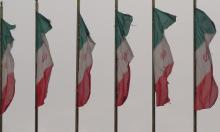George Bush lists international successes and remaining challenges
President George W. Bush said Thursday the world has seen "remarkable progress" toward resolution of longstanding conflicts, citing in particular the Israeli withdrawal from Gaza and the northern West Bank and the growing accommodation between India and Pakistan .

In his 49-page National Security Strategy report, Bush's also listed a series of unresolved challenges. They included conflicts in Sudan , Uganda and the Eritrea-Ethiopia region as well as three focused on Caribbean nations Cuba , Colombia and Venezuela .
The report summarizes Bush's plan for protecting America and directing relations with other nations. It is an updated version of a report Bush issued in 2002.
In his list of successes, Bush cited:
The Middle East Israeli forces have withdrawn from the Gaza Strip and the northern West Bank , "creating the prospect for transforming Israeli-Palestinian relations." The withdrawal also underscored the need for the Palestinian Authority to stand up "an effective, responsible government."
India-Pakistan Relations between two South Asian countries have improved, with an exchange of high-level visits and "a new spirit of cooperation in the dispute over Kashmir ."
Indonesia A cooperative approach to the relief effort following the tsunami resulted in political shifts that helped make possible a peaceful settlement in the bitter separatist conflict in Aceh.
Northern Ireland _ Implementation of key parts of the Good Friday Agreement, including the decommissioning of weapons, marked a "substantial milestone" in ending that long-standing civil conflict.
Sudan U.S.-led negotiations peacefully resolved the 20-year North-South conflict.
Liberia The United States led international efforts to restore peace and bolster stability after vicious internal conflict.
On his list of remaining challenges, Bush included:
Darfur The people of the impoverished region are the victims of genocide arising from a civil war that pits a murderous militia, backed by the Sudanese Government, against a collection of rebel groups.
Uganda A "barbaric rebel cult," the Lord's Resistance Army, is exploiting a regional conflict and terrorizing a vulnerable population.
Ethiopia and Eritrea A festering border dispute threatens to erupt yet again into open war.
Colombia A democratic ally is fighting the persistent assaults of Marxist terrorists and drug-traffickers.
Venezuela A "demagogue awash in oil money" is undermining democracy and seeking to destabilize the region, the report says.
Cuba "An anti-American dictator" continues to oppress his people and seeks to subvert freedom in the region, according to the report.
Nepal A vicious Maoist insurgency continues to terrorize the population while the government retreats from democracy.
"Regional conflicts can arise from a wide variety of causes, including poor governance, external aggression, competing claims, internal revolt, tribal rivalries, and ethnic or religious hatreds," Bush said.
"If left unaddressed, however, these different causes lead to the same ends: failed states, humanitarian disasters, and ungoverned areas that can become safe havens for terrorists", reports the AP.
D.M.
Subscribe to Pravda.Ru Telegram channel, Facebook, RSS!





